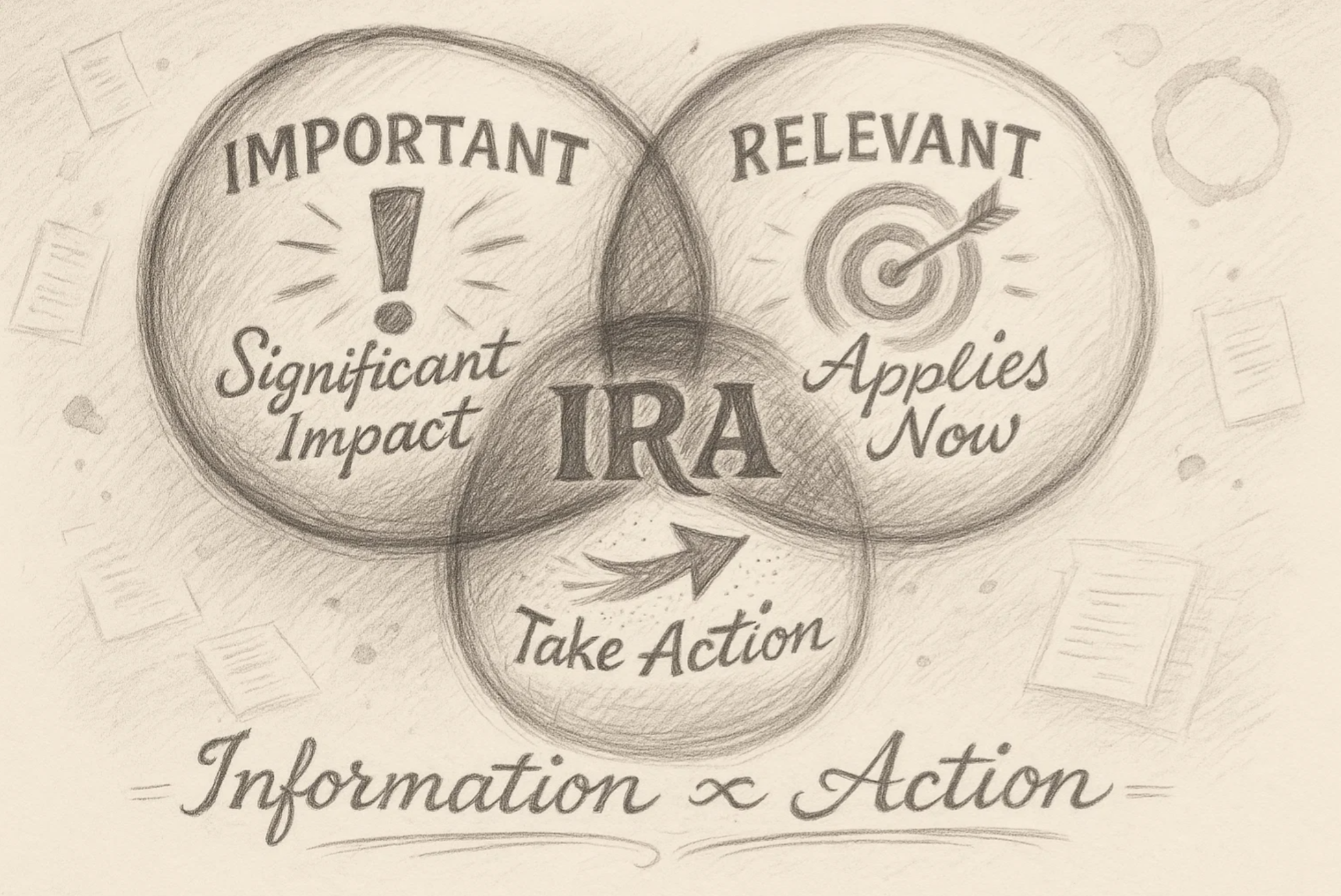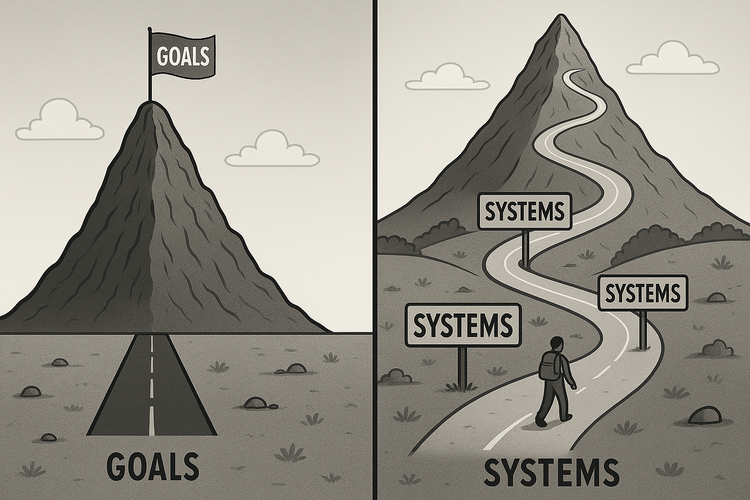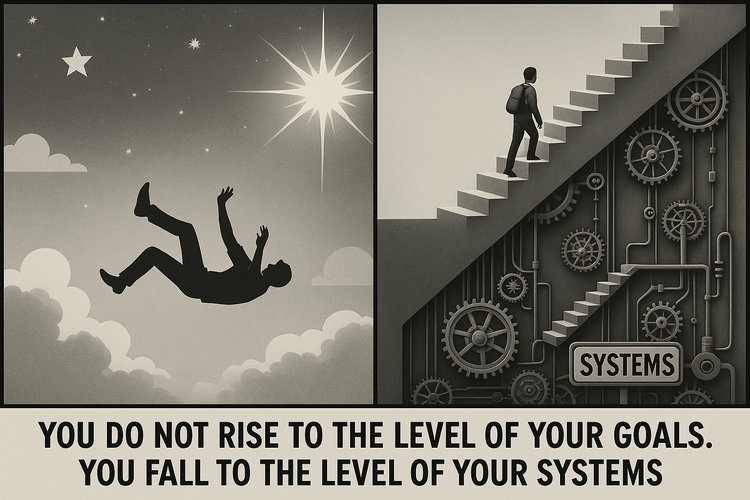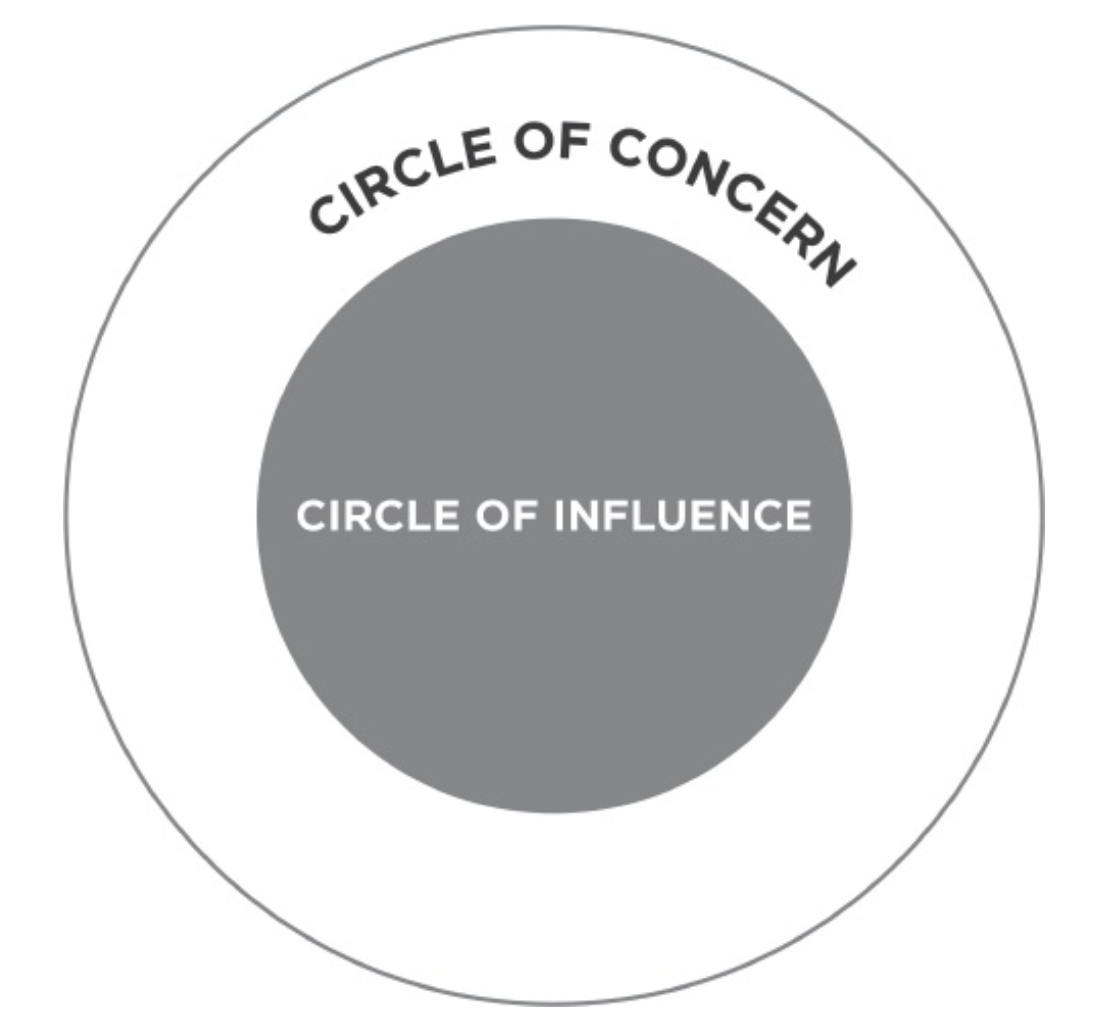DO NOT: Depend-On Nor Seek External Praise
Don't depend on, or seek external praise. And in Highly Avoid Internalizing External Praise
There are multiple important issues when it comes to external praise:
One is that you do not control it. Hence, that is in violation of focusing on what is under your control.
Songs
too many nested note refs

If we allow ourselves to focus on variables outside of our control, we take the focus from things we can change. Let me repeat. When you think about things outside of your control, you take resources away from things that can make your life better.
You have a finite amount of time and if you focus on that you cannot change, you steal time away from actions that bring change to your life.
IF: You focus on what you cannot change
THEN: you steal time away, from actions that bring change.
As you focus on what you control, your circle-of-influence (what you control), increases. Inversely if you focus on what you cannot change your circle of influence decreases.
Hence, focus on what you can control. Think about what you can control. Laser focus on variables under your control. Focus on your actions, focus on your inputs into this life, and take the outputs to re-evaluate your input actions.
Control The Type of Information You Intake
It becomes easier to focus on things that are under our control when we filter the type of information coming our way. When we limit the information to Important Relevant Actionable Information (IRA Info), most importantly actionable, then our mind tends to gravitate towards thoughts that are also actionable.
On the opposite end of the spectrum if we take in information that is in-actionable, then we are more likely to have negative thoughts with zero action output == worry. Mainstream media is great example of in-actionable often fear focused information, that is likely to use up thought cycles with no positive outcomes (For more refer to Manufacturing Consent). Hence, in typical situations it's best to be ignorant of such information, the important news of the world will reach you through other people.
IRA Info: Important Relevant Actionable

Information must be proportionate to action, particularly habitual consumption of information.
What information consumes is rather obvious: it consumes the attention of its recipients. Hence, a wealth of information creates a poverty of attention and a need to allocate that attention efficiently among the overabundance of information sources that might consume it. — Herbert Simon, recipient of Nobel Memorial Prize in Economics

Wealth of Information --creates--> Poverty of Attention
Most importantly: Information Must be Actionable
too many nested note refs

Quotes
too many nested note refs
I never watch the news and have bought one single newspaper in the last five years...In five years, I haven’t had a single problem due to this selective ignorance. - Tim-Ferris
For actionable information, I consume a maximum of one-third of one industry magazine (Response magazine) and one business magazine (Inc.) per month, for a grand total of approximately four hours/month. That’s it for results-oriented reading. - Tim-Ferris
Lifestyle design is based on massive action—output. Increased output necessitates decreased input.
Most information is time-consuming, negative, irrelevant to your goals, and outside of your influence.
I challenge you to look at whatever you read or watched today and tell me that it wasn’t at least two of the four. - Tim-Ferris
Develop the habit of asking yourself, “Will I definitely use this information for something immediate and important?” It’s not enough to use information for “something”—it needs to be immediate and important. If “no” on either count, don’t consume it. Information is useless if it is not applied to something important or if you will forget it before you have a chance to apply it. - Tim-Ferris
How to Grasp Specific Information
How to Grasp Specific Information: By Tim Ferris
too many nested note refs
Remember: Do not worry
Remember: If you can do something about a situation, then do not worry about it. Instead, go and enact change. If you cannot do anything, then do not worry about it. Instead, find something that you can change.
Quotes
“The chief task in life is simply this: to identify and separate matters so that I can say clearly to myself which are externals not under my control, and which have to do with the choices I actually control. Where then do I look for good and evil? Not to uncontrollable externals, but within myself to the choices that are my own” - Epictetus
“First understand the do-or-die importance of focus. If you don’t learn to focus, you will have a shallow and unrewarding life without any meaningful achievements. So make it a priority.” — Derek-Sivers
Corollary
Corollary: Do: Cultivate Indifference to What Is Outside Your Control (AntiWorry). To laser focus on what is inside of our control we must cultivate ignorance (ignore) things that our outside of our control.
If you focus on what you control
You train to be in the mindset of doing. The lens you look at the world focuses on things that you can change. And hence your perception of the world becomes that the world (your world) is changing and you see yourself as being able to influence the change.
Focus on your inputs
Before Focus: Establish Direction
Before laser focusing on something: make sure to have Clear Goals.
Focus on your Systems
Goals are about the results you want to achieve.
Systems are about the processes that lead to those results.

Use goals to set direction.
Rely on systems to make progress.
Goals and Systems Simplified
Goals: Your Destination
- Define what you want to achieve.
- Example: "Lose 20 pounds."
Systems: Your Path
- The daily habits that get you to your goal.
- Example: "Daily healthy eating and exercise."
Key Insights:
- Consistency beats intensity: Focus on small, regular actions.
- Enjoy the journey: Process matters more than the end result.
- Be adaptable: Adjust your habits as needed.
- Identity shift: Shift your identity to someone that is aligned with habits that lead to your goal.
Action Steps:
- Break goals into small habits.
- Track your habits.
- Review and adjust regularly.
- Patience is key.
Bottom Line
Goals set the direction; systems ensure progress. Focus on building and maintaining effective systems.

You do not rise to the level of your goals.
You fall to the level of your systems.
The Power of Systems Over Goals
The Essence of the Principle
- Goals: The targets we aim to hit.
- Example: "Win a marathon."
- Systems: The day-to-day behaviors and routines that define our progress.
- Example: "Consistent training schedule and nutrition plan."
Core Insights:
- Achievement mirrors your systems, not your ambitions: Success is less about the goals you set and more about the systems you follow.
- Build robust systems for inevitable success: The strength of your daily practices determines your level of achievement.
- Focus on what you can control: Concentrate on your actions and behaviors, which are within your control, rather than on outcomes, which often aren't.
- Adaptability within systems leads to growth: Systems that allow for feedback and adjustment are more effective in reaching long-term success.
Developing Strong Systems:
- Map out daily and weekly routines that align with your ultimate objectives.
- Implement consistent habits that are directly linked to your areas of focus.
- Regularly review and refine your systems based on outcomes and new insights.
- Embrace an identity that reflects the processes of your systems.
The Fundamental Truth
Your level of success is a reflection of the systems you implement and maintain, not the height of your goals. By focusing on building effective systems, you ensure continuous progress and long-term achievement.
Related
too many nested note refs
too many nested note refs
Songs
too many nested note refs
too many nested note refs
Related
Focus on your circle of influence
Proactive people focus their efforts in the Circle of Influence. They work on the things they can do something about. The nature of their energy is positive, enlarging and magnifying, causing their Circle of Influence to increase.

Anytime we think the problem is “out there,” that thought is the problem. We empower what’s out there to control us. The change paradigm is “outside-in”—what’s out there has to change before we can change.
Related Quotes
“The ignorant man’s position and character is this: he never looks to himself for benefit or harm, but to the world outside him. The philosopher’s position and character is that he always look to himself for benefit and harm.” — Epictetus, Enchiridion
God grant me the serenity to accept the things I cannot change, courage to change the things I can change; and wisdom to know the difference. - Serenity Prayer
Related
Related Thoughts
Clean up your room
too many nested note refs
Metadata
Related
Warren Buffet and Bill Gates picked the same word that account for their success: Focus - (ref)
Two is that there is some inherent want in most people for external praise. Hence, you are more pliable be compliant to your interlocutors if you accept/internalize external praise.
Don't expect any external praise. When you hear external praise don't let it affect you much either, since that can be a slippery slope to want more of it. Many of us internally a wired to get validation from outside world. That's why the Key Theme Is to Give Importance to Interlocutor in the classic communication Book: How to win Friends And Influence People. Since so many people crave such importance. People crave true praise.
The craving like many other cravings goes smaller if not fed. Or larger if allowed to gorge.
Three you are more susceptible to accept external blame, if you accept external praise.
Here is an audio by Alan-Watts on praise & blame. To highlight:
~You can't make praise mean anything unless you also go around blaming... If you the folly of that, that praise and blame are creating each other... Great sages never blame people and very rarely praise anyone audio timestamp - Alan-Watts
Transcript
You know that business about the responsibility of the person who gets murdered for getting murdered there is a curious sense in which a lot of people go around looking for trouble Freud powerpoints that pointed out by correctly the psychology of accident-prone individuals they seem to be attracting trouble like lights attract moths and we're all doing that but we managed to remain unconscious of it so that we can praise and blame and play the game which says that's not my fault that's your fault and so we go around apportioning faults to everybody because if we're going to apportion praise for what the good things people do you can't make praise mean anything unless you also go around blaming trays and blame go together supposing everybody was acting in a praiseworthy way and we praised everybody for everything they'll get tired of it they wouldn't even notice it anymore so so long as you're going to get a kick out of being praised you've got to go around blaming too it's very simple but if you see the folly of that that praising and blaming are just creating each other then you don't praise and you don't blame you just dig the whole thing and that's why when we encounter very great sages you never hear them blame people and they very rarely praise anyone you try to start gossip in the presence of such a person and you make a derogatory comment about someone it's as if you had thrown a rock into a well and heard no splash and a funny feeling because that you get no response you get no agreement and if you pray somebody there's also likely nothing to be said except perhaps some remark that of course you're praising the beloved in all its manifestations and this this disconcerts some people terribly I've always noticed that real sages never gossip never criticize persons and because they understand so well the French saying to compensate apart on a to understand all is to forgive all is so true if you are experienced in just the ordinary way of dealing with human problems if you've been a counselor or psychotherapist or minister or anything like that you very soon get to realize how vastly complicated people are and to see that they really are in the message they're in not because of anything but that's the way it is and you stop blaming people and because you don't blame people you have open ears and people come to seek your advice they don't want to come to someone who's a counselor who will ball them out it's like dentists who simply accept the fact that people really don't take care of their teeth and realize that the job of a dentist is precisely to look after people who can't be bothered to take care of their teeth that's why is in business so a good dentist doesn't vol his patients out because they didn't do this that in the other just accept it same with doctors they know perfectly well that nobody's going to live by the rules of health and they're very vague as to what they are there's every kind of theory about how you ought to live and what is healthy but they've change in fashion and what we ought to eat this kind of diet in 1921 when I the time it's 1930 they've changed their ideas all together by the time it's 1960 it's back again to a mixture between 9021 and 1894 something like that is it's always changing so while the rules that then are not so you see if they were all absurd it would be easy but they're not all absurd there's some truth in it always but nobody's ever quite sure so they would function of healers and doctors and so on is just to do what can be done to stop the mess getting too messy and they must accept it as that that's their job if I were healthy say to the doctor I wouldn't need you so you're in business
Related Thoughts
Related Thoughts
The happiness of your life depends upon the quality of your thoughts. - Marcus-Aurelius
Very little is needed to make a happy life; it is all within yourself, in your way of thinking. Marcus-Aurelius
Care about what other people think and you will always be their prisoner. - Lao-Tzu
“The tranquility that comes when you stop caring what they say, or think, or do. Only what you do.” - Marcus-Aurelius